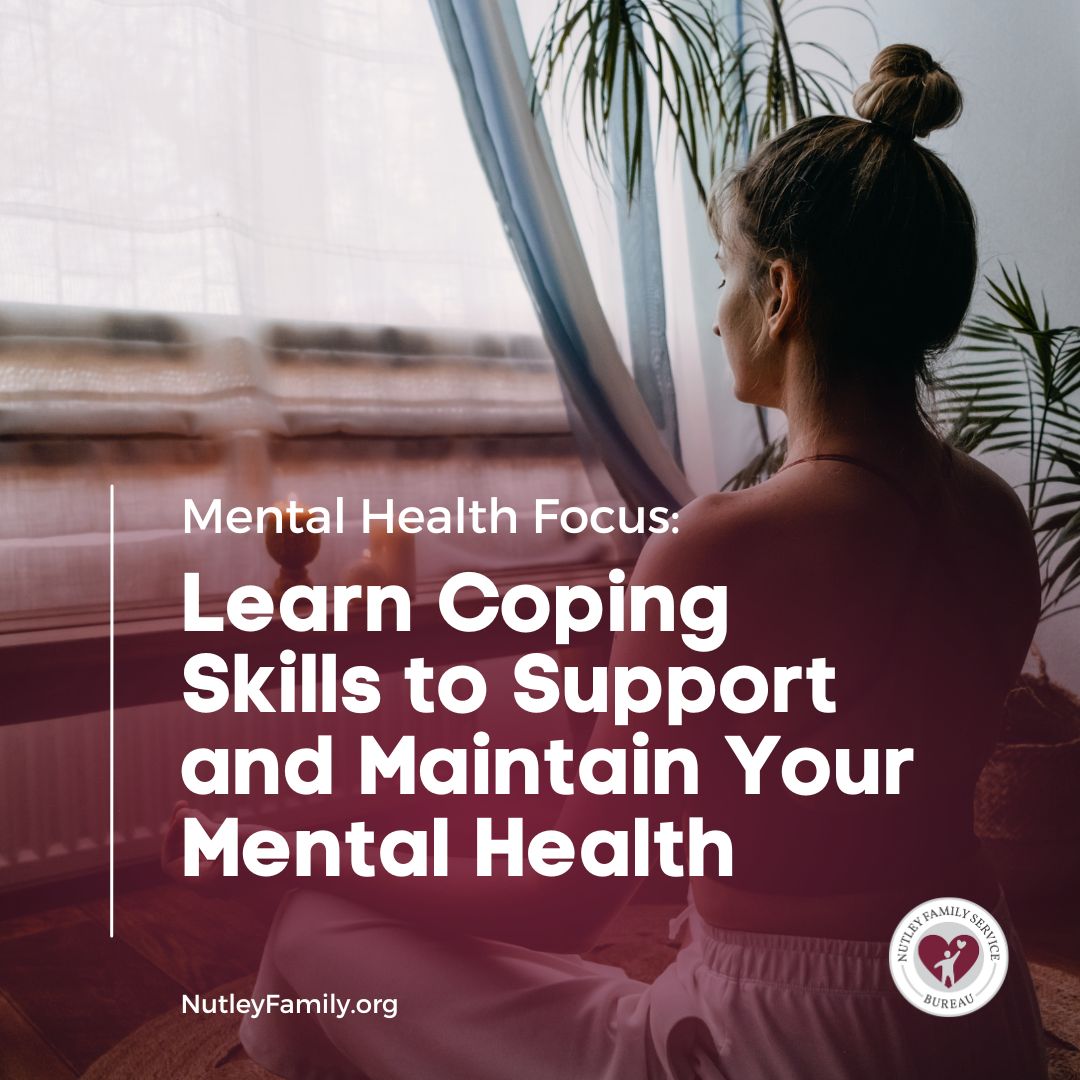-
Mental Health Focus: Learn Coping Skills to Support and Maintain Your Mental Health
- Posted on January 30, 2024
- by admin
- in All Articles, Mental Health, NFSB Blog
- Comments Off on Mental Health Focus: Learn Coping Skills to Support and Maintain Your Mental Health

The Mental Health Program at Nutley Family Service Bureau (NFSB) provides counseling and psychiatric services for individuals and families. New clients are welcome and immediate appointments are available, including virtual appointments. This article is part of an ongoing educational series focused on common mental health challenges, treatment techniques, and helpful tips.
Did you know there are coping skills you can practice on your own to help you get through a rough patch and maintain your mental health? Although professional counseling may be needed to overcome many mental health challenges, you have the power to improve your well-being. Coping skills are wonderful tools that support his process!
Here are five coping skills you can practice. No appointment required!
1) Self-Care
Self-care is part of almost every treatment plan at NFSB. We’ll speak with clients to get answers to important questions related to self-care, including:
- Are you getting enough sleep?
- What types of food do you eat? Are you overeating or not eating enough? Are you drinking enough water?
- Are you exercising? What types of exercise do you do?
Self-care is the practice of taking steps to live a healthy, fulfilling life – physically, mentally, and emotionally. Exercise, for example, doesn’t have to be about training for a 5K or fitting into summer clothes. Exercise releases endorphins that can reduce pain, improve mood, and reduce stress.
Self-care can be done on your own to do exactly what the name implies. Something as simple as taking a hot shower and wearing comfortable clothes can be a form of self-care. Care for yourself so you feel and function better!
2) Guided Meditation
Meditation trains your mind to become aware of the present moment without judgment while calming the mind and body. This can help you reduce stress and anxiety, control your emotions, and improve focus and concentration.
Guided meditations are easy to find on YouTube, social media, and mobile apps. The more you practice meditation, the better prepared you’ll be when you feel anxious or depressed.
3) Deep Breathing
When you get anxious, your heart rate tends to increase and breathing becomes shallow. Deep breathing tells your nervous system to slow down, which can result in a lower heart rate and slower, deeper breathing. This also increases oxygen intake, which can improve both your mood and cognitive function.
Deep breathing promotes the “rest and digest” response to stress and counteracts the “fight or flight response” that increases stress and drains energy. This not only can support greater relaxation, but also increase self-awareness. There are many deep breathing methods, so choose the one that’s comfortable and effective for you!
4) Gratitude
It’s not uncommon to start the day thinking about how bad things seem. Tomorrow was bad. Will today be worse? Instead, commit to starting your day with gratitude!
Make a gratitude list or keep a gratitude journal. Writing down your feelings can help you get negative thoughts out of your head and onto paper. Practicing gratitude, especially when you first wake up in the morning, can help you develop a more positive outlook and mindset.
5) Spend Time in Nature
Weather permitting, of course! Breathing fresh air and getting away from that which brings negative feelings can help you clear your mind. Gardening and planting flowers or vegetables can be very relaxing and fulfilling, especially as you see growth and blooming!
Nutley is filled with wonderful parks. Imagine practicing the coping skills we’ve discussed while surrounded by nature in a local park! You may also meet new people, build new relationships, and grow our support system.
How to Get Started
Don’t look at this list and feel as if you need a complete lifestyle change. Start small, choose coping skills that are enjoyable, and move at your own pace.
For example, consider going for a walk in the park a few days a week and cutting back on junk food. If you don’t think you can complete a 20-minute guided meditation, start at five minutes! Coping skills are intended to make you feel better, so practice skills that make sense for you as an individual!
If you’re practicing coping skills and still struggling, you may need additional support. Schedule an appointment for counseling at NFSB. New clients are welcome and immediate, in-person and virtual appointments for mental health counseling are available. Call 973-667-1884 extension 1.
If you enjoyed this article please consider sharing it!
Archives
- July 2024
- June 2024
- May 2024
- April 2024
- March 2024
- February 2024
- January 2024
- December 2023
- November 2023
- September 2023
- August 2023
- July 2023
- June 2023
- May 2023
- April 2023
- March 2023
- February 2023
- January 2023
- December 2022
- November 2022
- October 2022
- September 2022
- August 2022
- July 2022
- June 2022
- May 2022
- April 2022
- March 2022
- February 2022
- January 2022
- December 2021
- November 2021
- October 2021
- September 2021
- August 2021
- July 2021
- June 2021
- May 2021
- April 2021
- March 2021
- January 2021
- December 2020
- November 2020
- October 2020
- September 2020
- August 2020
- July 2020
- June 2020
- May 2020
- March 2020
- January 2020
- November 2019

















